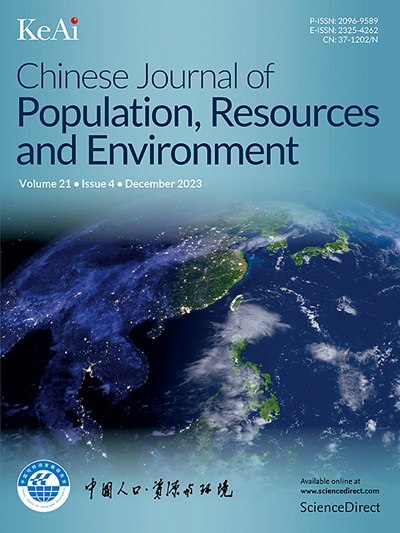China’s path to a global ecological civilization: Concepts and practices for sustainable development
IF 4.8
4区 环境科学与生态学
Q2 ENVIRONMENTAL STUDIES
Chinese Journal of Population Resources and Environment
Pub Date : 2025-09-01
DOI:10.1016/j.cjpre.2025.07.001
引用次数: 0
Abstract
China actively fosters practical green cooperation to advance global sustainable development, and strengthens global environmental governance initiatives, including the implementation of the Sustainable Development Goals (SDGs). However, this approach has often positioned China as more of a doer than a talker, leading to insufficient recognition in the international community. Domestic Chinese research has frequently highlighted these issues within the ecological civilization, especially in its global dimension. Building on existing research, this study contends that the disparity in recognition stems from three crucial gaps: a conceptual gap between ecological civilization as a new narrative and established international governance frameworks; a practical gap between how China’s ecological civilization advances sustainable development governance versus international understanding; and a communication gap between its substantial achievements and inadequate communication of these experiences. To address these gaps, this paper recommends that China strengthen its efforts in three key areas: First, maintain strategic resolve by deepening green practices and strengthening corporate environmental standards to advance green norms. Second, promote the global co-construction of ecological civilization and strengthen global governance featuring extensive consultation and joint contributions for shared benefits. Third, enhance fairness, representativeness, and inclusiveness in international sustainable development negotiations. Finally, China, along with Global South countries, should continue advancing global ecological civilization. This serves as both a response to current environmental governance challenges and a long-term pathway toward a global community of shared future.
中国的全球生态文明之路:可持续发展的理念与实践
中国积极开展绿色务实合作,推动全球可持续发展,加强全球环境治理倡议,包括落实可持续发展目标。然而,这种做法往往把中国定位为实干家,而不是空谈家,导致国际社会对中国的认可不足。中国国内的研究经常在生态文明的范围内,特别是在全球范围内强调这些问题。在现有研究的基础上,本研究认为,认识上的差异源于三个关键的差距:生态文明作为一种新的叙事与既定的国际治理框架之间的概念差距;中国生态文明如何推进可持续发展治理与国际认识之间的现实差距;在其取得的巨大成就和这些经验的不充分交流之间存在着沟通差距。为了解决这些差距,本文建议中国在三个关键领域加强努力:首先,通过深化绿色实践和加强企业环境标准来推进绿色规范,保持战略决心。第二,推动全球生态文明建设,加强共商共建共享的全球治理。第三,增强可持续发展国际谈判的公平性、代表性和包容性。最后,中国要同南方国家一道,继续推进全球生态文明建设。这既是对当前环境治理挑战的回应,也是迈向人类命运共同体的长远之路。
本文章由计算机程序翻译,如有差异,请以英文原文为准。
求助全文
约1分钟内获得全文
求助全文
来源期刊

Chinese Journal of Population Resources and Environment
ENVIRONMENTAL STUDIES-
CiteScore
4.30
自引率
1.10%
发文量
791
审稿时长
79 days
期刊介绍:
The Chinese Journal of Population, Resources and Environment (CJPRE) is a peer-reviewed international academic journal that publishes original research in the fields of economic, population, resource, and environment studies as they relate to sustainable development. The journal aims to address and evaluate theoretical frameworks, capability building initiatives, strategic goals, ethical values, empirical research, methodologies, and techniques in the field. CJPRE began publication in 1992 and is sponsored by the Chinese Society for Sustainable Development (CSSD), the Research Center for Sustainable Development of Shandong Province, the Administrative Center for China's Agenda 21 (ACCA21), and Shandong Normal University. The Chinese title of the journal was inscribed by the former Chinese leader, Mr. Deng Xiaoping. Initially focused on China's advances in sustainable development, CJPRE now also highlights global developments from both developed and developing countries.
 求助内容:
求助内容: 应助结果提醒方式:
应助结果提醒方式:


